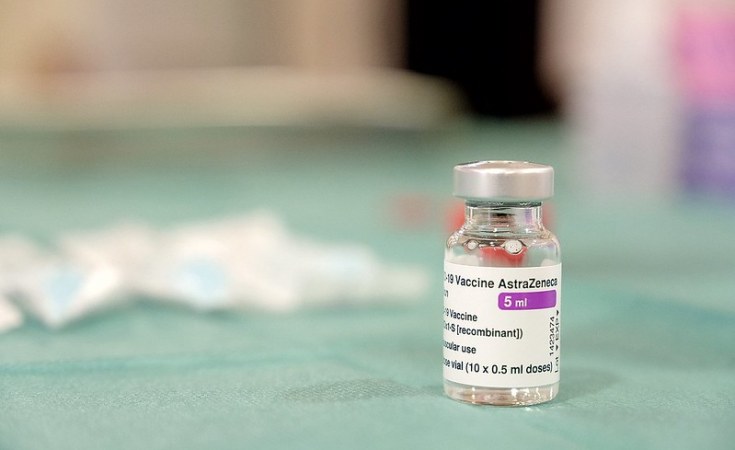AstraZeneca in partnership with the University of Oxford developed one of the first vaccines against COVID. The vaccine, which used an adenovirus to smuggle instructions into human cells to make antibodies against the novel coronavirus, saved countless lives. But a problem soon emerged. A tiny proportion - about one in 50,000 - of those vaccinated developed blood clots.
This blood clot syndrome is known as vaccine-induced immune thrombotic thrombocytopenia (VITT). In people with this condition, something goes wrong with the immune response and people make antibodies that can stick to one of the body's own proteins.
The protein is called platelet factor 4 (PF4). We know that in the course of infection, many people make antibodies that stick to PF4 as part of the immune response, but these antibodies usually stick weakly. In VITT, antibodies form that can stick to PF4 like superglue.
The antibodies in VITT glue PF4 molecules together, forming large structures known as "immune complexes". These complexes bind to and activate small cells called platelets that are vital for blood clotting. Normally, platelets float around in the blood in an inactive state, but once activated they spread out, get very sticky, and spew out hundreds of different chemicals.
In VITT, platelets are strongly activated and this causes blood clots. The blood clots commonly affect the veins surrounding the brain, which is a very unusual and rare site for clots. Many people with VITT reported excruciating headaches, which continue to affect survivors.
Billions of platelets get used up in these clots, leading to low numbers of platelets in the blood. In some patients, this led to serious bleeding and nearly one in four died. Many survivors are also have life-long, disabling symptoms.
Looking for clues
In just two and a half years, doctors and scientists around the world have begun to unravel the secrets of VITT. How VITT causes clots and why some people get it is a main area of work. Through understanding this, potential treatments are also being discovered.
So far, there is only one genetic clue as to why some people get VITT. A variation of a gene that makes parts of antibodies is linked to VITT and this is more common in people of European descent - Europeans seem to be at higher risk of VITT. There must be other genes involved, but they are tricky to find. In the UK, scientists have done DNA sequencing on over 200 patients with VITT and results are expected soon.
In our lab, we work on how platelets get activated in VITT. In 2021, our team showed the main mechanism for platelet activation and have recently discovered another mechanism. In a test tube, we can block this activation with commonly used medicines.
We also see a lot of variation in how platelets from healthy people respond to PF4 and VITT antibodies. We think that this variation in responses is a reason why some people get VITT. We are doing more work to find out the differences between platelets of "high" and "low" responders.
Another major puzzle with VITT is why so many people have clots in the brain. To put this into perspective, spontaneous clots in the brain are very rare. They only affect around three or four people in a million a year, yet over half of the patients with VITT had these clots.
There are some theories about why clots in the brain happen more in patients with VITT. These include the speed of blood flow, and the stickiness of PF4 and antibodies to the blood vessels. Recently, Canadian scientists showed that patients whose antibodies stick to PF4 the strongest are most likely to get clots in the brain.
Still widely used in low-income countries
Although adenoviral vaccines have saved millions of lives, they have fallen out of favour in developed countries because of the risk of VITT. However, these vaccines are still widely used in low-income countries. They are highly effective, cheap, and much easier to store and transport than mRNA vaccines - such as the Pfizer-BioNTech and Moderna jabs.
Improving the knowledge of VITT has also prompted scientists to look more closely at other patients with unexplained blood clots. Remarkably, more and more patients with clots, low platelets, and VITT-like antibodies are being found. These cases are unrelated to vaccination.
Recently, a VITT-like syndrome was reported in two patients after adenovirus infection rather than vaccination. Testing for these antibodies will probably become routine for patients with unexplained blood clots.
Most importantly, imagine a new pandemic that is a lot more dangerous than COVID - perhaps a third of people who catch it die. There would be panic and chaos. We would desperately need adenoviral vaccines despite the risk of VITT. That's why it's important to understand VITT inside and out.
Richard Buka, Haematology Registrar and Clinical Research Fellow, University of Birmingham
Samantha Montague, Postdoctoral Research Fellow, Institute of Cardiovascular Sciences, University of Birmingham


